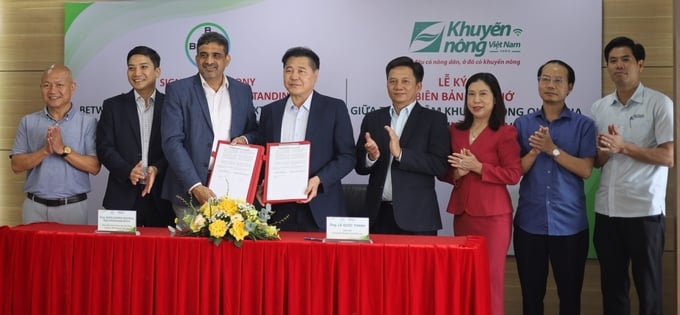November 27, 2025 | 06:27 GMT +7
November 27, 2025 | 06:27 GMT +7
Hotline: 0913.378.918
November 27, 2025 | 06:27 GMT +7
Hotline: 0913.378.918

The two parties signed the partnership on the afternoon of October 14. Photo: Phi Yen.
On the afternoon of October 14, the National Agricultural Extension Center signed a partnership with Bayer Vietnam Co., Ltd. to expand sustainable farming models and promote efficient and safe rice, durian, and coffee cultivation, aiming to improve productivity and product quality in Vietnam by 2025.
Attending the signing ceremony were Le Quoc Thanh, Director of the National Agricultural Extension Center, and Kedelesara Govinda Rao Krishnamurthy, Head of Crop Science Division at Bayer Vietnam Co., Ltd.
The collaboration program aims to enhance agricultural productivity and introduce innovations in farming practices through model farms in key growing regions. It will implement an integrated plant health management program, integrated pest management, and promote the application of good agricultural practices for rice, durian, and coffee farmers, contributing to sustainable agriculture development.
Both parties will also focus on contributing to the effective implementation of the 1 million hectares of high-quality, low-emission rice project. This includes improving rice productivity and management in the Mekong Delta provinces by building high-quality, low-emission rice production models, as well as applying integrated pest management to ensure the efficient, safe, and sustainable cultivation of durian and coffee.
Translated by Mai Quang Huy
/2025/11/26/4909-2-154329_878.jpg)
(VAN) Pearl grouper farming in HDPE cages not only delivers economic efficiency but also contributes to protecting the environment, creating jobs, and promoting marine-based experiential tourism.

(VAN) The model of making a living under the forest canopy through the agroforestry system in Van Son commune, Bac Ninh province, is expected to generate an annual income of approximately VND 30 million/ha.

(VAN) Many enterprises in Can Tho are harnessing natural energy and reducing greenhouse gas emissions in their production processes, thereby contributing to the promotion of a sustainable green transition.
/2025/11/24/3536-2-112800_176.jpg)
(VAN) Dong Nai now has tens of thousands of hectares of forests certified for sustainable management, and this area will continue to be expanded in the coming period.

(VAN) Vinh Ha hamlet (Dai Xuyen commune, Hanoi) is shifting away from small-scale farming as households adopt bioscurity into their breeder chicken models.

(VAN) Heavy rains make aquatic species more vulnerable to disease. Proactive water management and high-tech systems help farmers prevent outbreaks and protect yields.

(VAN) Greenhouses are shifting production mindsets in Binh Lu commune, enabling farmers to ‘weather the sun and rain’ and secure stable vegetable harvests throughout the year.